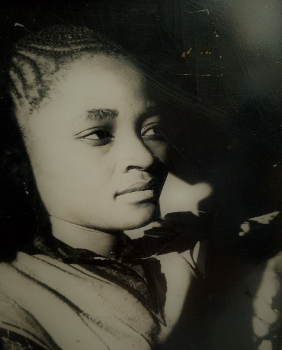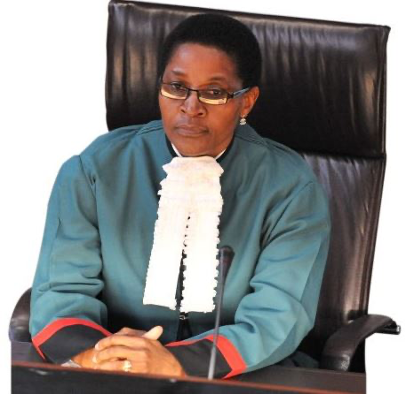Justice Bess Nkabinde
“I see myself as somebody who is a servant to the people of this country … I only do what is expected of me, by this country ... but I’ll serve them fearlessly, without favour, and when criticism comes, as it normally does, you take it in good spirit, knowing that you are here to serve.”
Justice Bess Nkabinde’s first practical legal experience was between 1983 and 1988 when she drafted legislation in the former Bophuthatswana homeland. She also acted as State Law Advisor before she was admitted as an advocate and became a judge in 1999. She was nominated by senior judges and was subsequently appointed to the Constitutional Court in 2006. She is known for her regal presence and being a role model, especially to black women in the legal profession.
Early Life and Career
Baaitse Elizabeth “Bess” Nkabinde (née Motsatsi) was born in 1959 in the small village of Tlokweng (Silwerkrans), north-west of Rustenburg. Born of royalty, she grew up with 23 “brothers” and “sisters”, although only two younger brothers were her biological siblings. The others were children from the village, most of whom were orphaned and abandoned, while others were customarily adopted. Nkabinde’s mother embraced and raised all these children as her own.
Twenty-three children is a lot. There was a big rondavel at home. We all slept there … Boys and girls. We grew up in that kind of a humbling environment. And I, actually, remain indebted to my parents because that (humbling gesture) has taught me humility and sharing.
Bess Nkabinde
Justice of the Constitutional Court
She began her schooling at the local primary school and then went on to Gabonewe Secondary School (in the Madikwe Township). She matriculated at Mariasdal High School in Tweespruit, Free State in 1979. Nkabinde obtained a BProc degree at the University of Zululand in 1983. She continued her studies while employed as a State Law Advisor in the erstwhile homeland of Bophuthatswana, today the North West province, and completed her LLB degree in 1986 at the North-West University, then commonly known as UNIBO (University of Bophuthatswana).
Nkabinde worked as a State Law Advisor and was admitted as an advocate in Mmabatho, Mafikeng, in 1988. She served her pupillage in Johannesburg and was admitted to the Pretoria High Court in 1989. She signed the red book at the local Bar, and began practicing in Mafikeng in January 1990, less than two months before her daughter was born.
I just wanted to study law to become a lawyer. I applied to the University of Zululand to be enrolled for a law degree, and … That’s how it [turned] out. I didn’t think of anything else. I mean, I never thought of being a social worker or a nurse or a teacher. I just had this (ambition) since that time.
Bess Nkabinde
Justice of the Constitutional Court
In February 1999, at the recommendation of the late Judge Joshua Alpheus Mdabula Khumalo and the insistence of the then Judge President Gerald Friedman, Nkabinde was elevated to the bench and acted as a judge of the High Court in Mafikeng until she was permanently appointed in October that year. She acted as a judge of the Labour Court between 2000 and 2002, and later as an acting judge of the Labour Appeal Court ( 2003 – 2005) at the insistence of Judge President Raymond Zondo, the current Deputy Chief Justice. At the invitation of the President of the Supreme Court of Appeal, President Craig Howie, Nkabinde also acted as a Judge of Appeal for two terms in 2005.
Appointment to the Constitutional Court
Nkabinde was nominated for appointment as Justice of the Constitutional Court by Judge Zondo and Judge Ronald Hendricks in 2005. Her acceptance of the nomination was met with some resistance in the legal field as she was relatively young and regarded as inexperienced. After the interview in October 2005, she was appointed Judge of the Constitutional Court by President Thabo Mbeki, with effect from January 2006.
She reflects on her experience at the Constitutional Court:
The Court was an inspiration and really something to look forward to. Not in terms of being here, because I actually never even thought of being a judge in this Court, but as a lawyer, you know, knowing that we are all moving towards this change, we all have to participate in making the difference. Because as lawyers we really make a contribution to our jurisprudence. So from that perspective it was quite an experience … An exciting experience.
Bess Nkabinde
Justice of the Constitutional Court
When the former Deputy Chief Justice Dikgang Moseneke was due to retire from active service as a Justice of the Constitutional Court in 2016, Chief Justice Mogoeng Mogoeng recommended Nkabinde to act as Deputy Chief Justice. She was appointed by President Jacob Zuma in May 2016, and acted as Deputy Chief Justice in November 2016. Nkabinde retired as a Justice of the Constitutional Court in December 2017.
Judgments of Interest
Fatima Hassam was married to Ebrahim Hassam in a polygynous Muslim marriage. Ebrahim died without a will, and on his death certificate it showed that he “had never married”. Women married in polygynous Muslim marriages are not considered “spouses” in terms of the Intestate Succession Act 81 of 1987 (the Act), and thus cannot inherit from their intestate spouses. Fatima took the matter to the Western Cape High Court which found that the exclusion of women married in Muslim marriages was unconstitutional and ruled that the term “spouse” should include these women as well.
The matter was sent to the Constitutional Court for confirmation. The Constitutional Court, in a judgment written by Justice Nkabinde, confirmed the High Court’s ruling, and further stated that the exclusion of women married in polygynous marriages from the Act infringes on their constitutional rights to equality, religion, and culture.
By discriminating against women in polygynous Muslim marriages on the grounds of religion, gender, and marital status, the Act clearly reinforces a pattern of stereotyping and patriarchal practices that relegates women in these marriages to being unworthy of protection. Needless to say, by discriminating against those women, the provisions in the Act conflict with the principle of gender equality which the Constitution strives to achieve. That cannot, and ought not, be countenanced in a society based on democratic values, social justice and fundamental human rights.
Justice Bess Nkabinde
the Hassam judgment, 15 July 2009
The matter concerned a dispute between the Juma Musjid Primary School Governing Body, the MEC for Education (KwaZulu-Natal), parents and learners at the School, and the Juma Musjid Trust (the owner of the private property). The Trust (a legal entity) had concluded a lease agreement with the MEC under the South African Schools Act to use the property, at the center of this dispute, as a primary school. The dispute arose when the tenancy by the School could not be continued. The Trust sought and obtained an eviction order in the High Court, which was upheld by the Supreme Court of Appeal, thereby protecting the private interests of the Trust.
In a judgment written by Justice Nkabinde, the Constitutional Court recognised the polycentric nature of the dispute, it did not readily allow private interests to trump public interests. It afforded the parties the opportunity to engage with one another in an effort to resolve the dispute and permit the continued operation of the school. When the parties failed to reach consensus, the Court was finally satisfied that alternative accommodation had been made for the enrolment of the learners for the 2011 school year. It was only then that the Court (having evenly balanced the private interests under the common law and the public interests of the learners in terms of the Constitution) granted the eviction order which was to take place at the end of the school year in December 2010.
Justice Nkabinde sets out the historical roots of inequality in South Africa’s education system as follows:
The significance of education, in particular basic education for individual and societal development in our democratic dispensation in the light of the legacy of apartheid, cannot be overlooked. The inadequacy of schooling facilities, particularly for many blacks was entrenched by the formal institution of apartheid, after 1948, when segregation even in education and schools in South Africa was codified. Today, the lasting effects of the educational segregation of apartheid are discernible in the systemic problems of inadequate facilities and the discrepancy in the level of basic education for the majority of learners.
Justice Bess Nkabinde
the Juma Musjid judgment, 11 April 2011
Life after the Constitutional Court
Nkabinde was appointed as an Acting Judge of Appeal on 1 October 2018 at the Supreme Court of Namibia, where she currently serves.
Family and Personal Life
Nkabinde and her husband, Major-General Bailey Segomotso Mmono, have four children. She is a sportswoman, loves music, and enjoys the outdoors (camping).
In the words of others
As a woman in our profession, with skew gender demographics towards men, Justice Nkabinde remains a beacon of hope and an inspiration to all women lawyers that one day parity of representation of women at the Bar and at the bench will be attained. Justice Nkabinde and other women justices have carved the path that shines a way for all women, especially women of colour that it is indeed possible to thrive and make a mark in the profession, which is in need of diversity and transformation.
Anthea Platt
advocate with Advocates for Transformation
Through her life we learned that success is not determined by gender or race.
Lutendo Sigogo
President of the Black Lawyers Association
Fierce in her devotion to the rule of law, tempered by grace as she sought the just result that would most benefit the people, hers is a singular mind, incisive and piercing in her legal reasoning but it was never intimidating, she was always clear and accessible in her writing. What I remembered, beyond her incomparable legal mind, was her sincere and genuine kindness which came across in how she treated and interacted with not only her colleagues and peers, but those who were her subordinates. She accorded respect, kindness, and dignity to all: from the Chief Justice, to the janitor, to the home sick clerk.
Funmi Ojetayo
former international law clerk at the Constitutional Cour
The manner with which Justice Nkabinde delivered herself when she presided: calm, patient, listening. We have marvelled at the way she has been able to take out that which has troubled us especially as black South African women … We admire her because in many instances, she has come out to say, I am principled, and I will live by the principles I believe in.
Thandi Modise
Speaker of the National Assembly of South Africa



